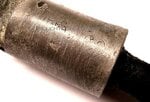We suspected that the Halifax bomber NA260 L8-G from the 347th Sqdn (Built at Rootes Securities) and flown by pilot Aulen with his French crew in 1945 would have crashed in Nederweert. Trace searchers from Brabant and Belgium have been speculating and writing for years that this plane crashed in the Veluwepeel near Asten-Heusden, but no remains of the plane have ever been found there before. Many Media also wrote reports about this.

What really happened, this Halifax NA260 L8-G crashed in a forest in the north of Nederweert (Netherlands) after it was shot down by Gerhard Ferdinand Otto Raht of the German Night hunting gunner 2 flying in a German Junkers 88 night fighter. A remarkable find is a brass cross with a red copper chain of which the wooden interior has disappeared after all these years. The cross was found next to the sandy path over which the aircraft remains were disposed of, together with remains of Bristol-Hercules Motors. That this is the heavy 4-engine Halifax MKIII NA260 L8-G that crashed in February 1945, has been conclusively proven by us on the basis of the found and numbered parts and by means of eyewitness statements and archive data.
Remains of this Halifax included dozens of kilos of alumium scrap, parts of the df-loop antenna, the bakelite tail light, fuse boxes, cable connectors, several parts of the Bristol Hercules star engines, parts of the oxygen system, valves, parts of the fuel tanks, parts of the cockpit, parts of the braking system as well as parts of the pilot equipment. We also found several portable oxygen cylinders as well as permanently installed oxygen cylinders and parts of the ammunition supply. It is also a fact that after the war the aircraft remains were transported over a sandy path, several engine parts were found on a sandy path meters apart at a very shallow depth, (Along the path no further traces of this bomber were found.)
The 4 impact craters further on all contain parts of Bristol-Hercules engines.
At a distance of 80 meters from here the rear turret of this Halifax came down near a cut down pine forest, here are parts of plexiglass as well as many electrical parts and a plate with the "R2" stamp which stands for; "Rootes Securities" (Halifax MKIII).
Parts with French texts have also been found recently. A confirmation we had for a long time has been proven to be irrefutable, this is the crash site of the Halifax NA260 L8-G flown by a French crew.
Through cooperation between the Air War Foundation 1939-1945 at Nederweert and Foundation for Regional Archaeological Soil Research (STRABO) A research report has been published in Ospel, the Netherlands, of which at the bottom of this report the link to almost 200 pages of document, full of previously unpublished documents, photos, witness statements and archival data.
A brass clip found at the crash site in Nederweert with "French text" "Collier A 60",
Anything else you will find in this link;
Halifax NA260 L8-G a mystery finally unravelled

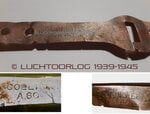
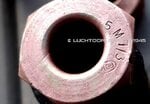
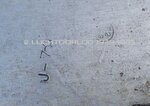

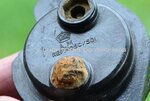
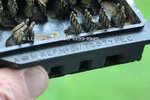
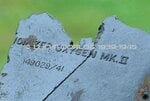
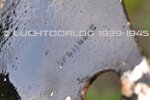

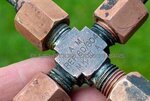
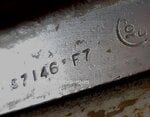


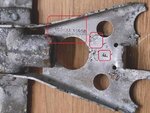


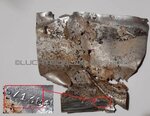
What really happened, this Halifax NA260 L8-G crashed in a forest in the north of Nederweert (Netherlands) after it was shot down by Gerhard Ferdinand Otto Raht of the German Night hunting gunner 2 flying in a German Junkers 88 night fighter. A remarkable find is a brass cross with a red copper chain of which the wooden interior has disappeared after all these years. The cross was found next to the sandy path over which the aircraft remains were disposed of, together with remains of Bristol-Hercules Motors. That this is the heavy 4-engine Halifax MKIII NA260 L8-G that crashed in February 1945, has been conclusively proven by us on the basis of the found and numbered parts and by means of eyewitness statements and archive data.
Remains of this Halifax included dozens of kilos of alumium scrap, parts of the df-loop antenna, the bakelite tail light, fuse boxes, cable connectors, several parts of the Bristol Hercules star engines, parts of the oxygen system, valves, parts of the fuel tanks, parts of the cockpit, parts of the braking system as well as parts of the pilot equipment. We also found several portable oxygen cylinders as well as permanently installed oxygen cylinders and parts of the ammunition supply. It is also a fact that after the war the aircraft remains were transported over a sandy path, several engine parts were found on a sandy path meters apart at a very shallow depth, (Along the path no further traces of this bomber were found.)
The 4 impact craters further on all contain parts of Bristol-Hercules engines.
At a distance of 80 meters from here the rear turret of this Halifax came down near a cut down pine forest, here are parts of plexiglass as well as many electrical parts and a plate with the "R2" stamp which stands for; "Rootes Securities" (Halifax MKIII).
Parts with French texts have also been found recently. A confirmation we had for a long time has been proven to be irrefutable, this is the crash site of the Halifax NA260 L8-G flown by a French crew.
Through cooperation between the Air War Foundation 1939-1945 at Nederweert and Foundation for Regional Archaeological Soil Research (STRABO) A research report has been published in Ospel, the Netherlands, of which at the bottom of this report the link to almost 200 pages of document, full of previously unpublished documents, photos, witness statements and archival data.
A brass clip found at the crash site in Nederweert with "French text" "Collier A 60",
Anything else you will find in this link;
Halifax NA260 L8-G a mystery finally unravelled



















